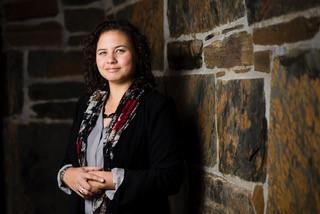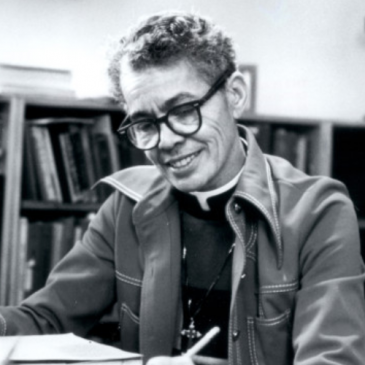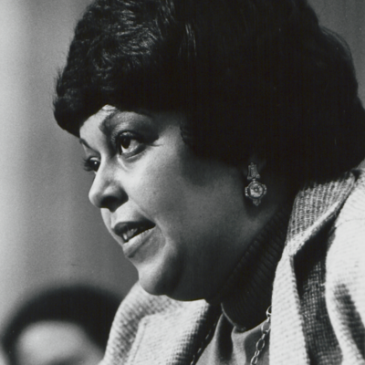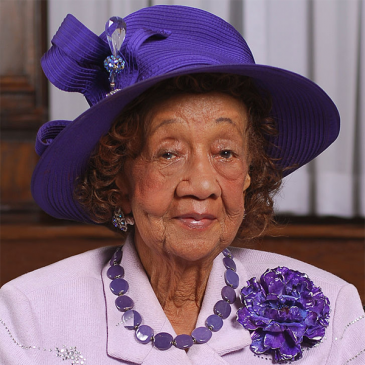
We Who Believe in Freedom: Black Feminist DC
We Who Believe in Freedom: Black Feminist DC traced Black feminism in Washington, DC from the turn of the 20th century through the civil rights and Black Power movements to today.
Curated by renowned historians Sherie M. Randolph and Kendra T. Field, the exhibition focused on the stories and voices of Black feminist organizers and theorists— including Anna Julia Cooper, Eleanor Holmes Norton, Mary Treadwell, and Nkenge Touré—whose expansive work made a difference in the lives of Black women in their Washington, DC communities and for all people throughout the United States. Standing at the intersection of race, class, and gender, Black feminists fought for a definition of freedom and liberation that extended beyond their individual circumstances—work that remains unfinished today.
We Who Believe in Freedom: Black Feminist DC was on view on the first floor of the Martin Luther King Jr. Memorial Library in Washington, DC as part of a groundbreaking partnership between the National Women's History Museum and DC Public Library. Read news about the exhibition here.
Explore the Online Exhibition
Explore this special online exhibition that shares and expands upon the stories told in We Who Believe in Freedom: Black Feminist DC, on display at the Martin Luther King Jr. Memorial Library in Washington, DC, March 2023–Fall 2024.
Featured Biographies
About
Team
Dr. Kendra T. Field, Associate Professor of History and Studies in Race, Colonialism and Diaspora, Tufts University; Curator

Dr. Kendra Taira Field is associate professor of history and director of the Center for the Study of Race and Democracy at Tufts University. She is also interim co-chair of the newly-founded Department of Studies in Race, Colonialism, and Diaspora. Field is the author of Growing Up with the Country: Family, Race, and Nation after the Civil War (Yale, 2018) and served as assistant editor to David Levering Lewis’ W.E.B. Du Bois: A Biography (Henry Holt, 2009). Her current book project, The Stories We Tell (W.W. Norton), is a history of African American genealogy and storytelling from the Middle Passage to the present. Field's articles have appeared in the Journal of American History and the American Historical Review. Beyond the academy, Field is co-founder and co-director of the African American Trail Project and project historian for the W.E.B. Du Bois Center for Freedom and Democracy.
Field has been awarded fellowships from the Ford Foundation, the Andrew W. Mellon Foundation, the Huntington Library, and Harvard University's Charles Warren Center in American History. She is the recipient of the Western Writers of America's 2017 Spur Award for Best Western Short Nonfiction, the 2016 Boahen-Wilks Prize, and the 2022 NAACP W.E.B. Du Bois Award. Field has advised and appeared in historical documentaries including Henry Louis Gates, Jr.'s The African Americans: Many Rivers to Cross (2013), Roots: A History Revealed (2016), and Tulsa Burning: The 1921 Race Massacre (2021). Field received her Ph.D. in American history from New York University. She also holds a master's in public policy from Harvard University's Kennedy School of Government and a B.A. from Williams College. Before entering the academy, she worked in education, organizing, and the non-profit sector in Boston and New York.
Dr. Sherie M. Randolph, Associate Professor of History Georgia Institute of Technology; Curator

Sherie M. Randolph, Ph.D., is an associate professor of history at the Georgia Institute of Technology and the founder of the Black Feminist Think Tank. Formerly an associate professor of history and African American Studies at the University of Michigan, Ann Arbor. Randolph’s book Florynce “Flo" Kennedy: The Life of a Black Feminist Radical, published by the University of North Carolina Press (October 2015), examines the connections between the Black Power, civil rights, New Left and feminist movements.
The former associate director of the Women’s Research & Resource Center at Spelman College, Randolph has received several grants and fellowships for her work, most recently being awarded fellowships from the University of Connecticut’s Humanities Institute and Brown University’s Howard Foundation.
Randolph is currently writing her second book "Bad” Black Mothers: A History of Transgression.
Susan Danish, Treasurer, NWHM Board of Directors
Zoe Schoen, Exhibition Researcher
Susan Gail Johnson, SGJ Consulting LLC
Dr. Lori Ann Terjesen, VP of Education, NWHM
Tessellate Studio, Exhibition Designer
Capitol Museum Services, Exhibition Fabricator
Blue Telescope Labs, Interactive Technology Designer
The Exhibition Advisory Committee
Lee Murphy
NWHM acknowledges the early contributions of Holly Hotchner and Dr. Aleia Brown.
FAQ
-
What is Black feminism?
The exhibition uses the phrase "Black feminism" to capture the emancipatory creative vision and acts of sabotage among many different Black people featured in the exhibition. Individually and as part of broader coalitions, they articulated their understanding of Black womanhood, the intersectional oppression Black women experience, and the full meaning of freedom and liberation. - Why is NWHM presenting an exhibition about Black feminism in DC?
As part of our innovative partnership, NWHM seeks to complement the DC Public Library’s mission and help amplify the history of local women who played critical roles in the communities of the NWHM’s hometown of Washington, DC. While Black women are foundational to the city’s history, their work and contributions reverberate across the country. A focus on Black feminism in DC helps us see the central role the nation’s capital played in shaping Black feminist thought, action, and institution building.
NWHM recognizes the importance of Black women telling their own stories, and to help achieve this goal, NWHM worked with renowned scholars Dr. Sherie Randolph and Dr. Kendra Field, experts in the histories of Black feminism in the 19th and 20th centuries. NWHM extends its thanks to Dr. Randolph and Dr. Field for their curatorial expertise in developing this exhibition.
- What if I can’t make it to Washington, DC to visit the exhibition in person and want to learn more?
You can explore the stories highlighted in the exhibition, as well as further learning resources, through the special Story Maps exhibition here. You can also attend virtual programs related to exhibition topics. Find out more here.
- Will there be someone at the exhibition to give me a tour?
This exhibition is primarily self-guided. There are pamphlets on site to help guide your visit, as supplies last. Free guided tours are offered each month. You can learn more about guided tours by visiting NWHM's events page here. If you have questions during or after your visit, you can always email history@womenshistory.org
- Is the exhibition in Washington, DC accessible?
The design team has developed the exhibition with a wide variety of users in mind. The exhibition itself accommodates wheelchairs and other mobility aids in all spaces. Visual Descriptions will be available that can be accessed through a personal device. All in-gallery videos include open captions.
 Awards
Awards
The National Women's History Museum, in partnership with our creative partners Tessellate and Blue Telescope, is proud to have received six awards honoring We Who Believe in Freedom: Black Feminist DC.
2024 CORE77 Notable Award
2024 Silver Muse Awards (Tessellate)
- Experiential & Immersive — Exhibition Experience
- Experiential & Immersive — Community
- Experiential & Immersive — Diversity & Inclusion
2024 Bronze Anthem Award (Blue Telescope)
2023 Gold MUSE Award (Blue Telescope)
Sponsors

We Who Believe in Freedom: Black Feminist DC's online presence is sponsored by ArentFox Schiff.
The National Women's History Museum would like to thank the following founding investors for their generous contributions to this exhibition:
Morgan Stanley
Chicago Pacific Founders
Kaiser Permanente
AARP
Mary Tolan
Meryl Streep, Silver Mountain Foundation for the Arts
Susan D. Whiting
Mari Snyder Johnson
Dr. Nancy O'Reilly Women Connect 4 Good Foundation
Jon S. and Kerrie Bouker
Image credits:
Top: Jack Rottier photograph collection, Collection #C0003, Special Collections and Archives, George Mason University.



